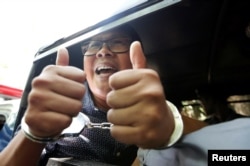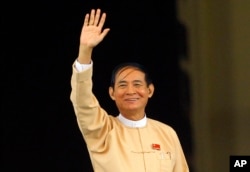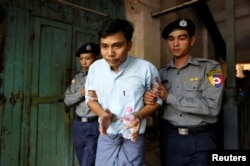Two local journalists for the Reuters news agency remain in custody in Myanmar after a court Wednesday refused to drop an espionage case against them. Detained since December, Wa Lone and Kyaw Soe Oo each faces the prospect of 14 years in prison unless new Myanmar President Win Myint revives a custom of pardoning political prisoners and detainees following the traditional new year festival of Thingyan, which starts Friday and runs through Tuesday.
“There is no plan” for a mass pardon, Minn Htun Soe, a spokesperson for the Prisons Department under the military-controlled Ministry of Home Affairs, told VOA. “I don’t know when there will be,” he said. The department is generally tasked with identifying prisoners who are suitable for pardons before those names are forwarded to the president. The president’s office could not be reached for comment.
The Assistance Association for Political Prisoners, or AAPP, a nonprofit advocacy group, has counted 248 political prisoners. The group says in that number, 54 political prisoners are serving sentences, 74 are in pretrial detention, and 120 face charges but are on bail. Restrictive laws have enabled authorities to jail activists and journalists for speech, protest and association.
Wa Lone and Kyaw Soe Oo were accused of violating the colonial-era Official Secrets Act for possession of material relating to security operations in Myanmar’s troubled Rakhine state. The military campaign against insurgents has driven hundreds of thousands of Rohingya Muslims from predominantly Buddhist Myanmar to neighboring Bangladesh. The AAPP considers the reporters political prisoners.
Wa Lone and Kyaw Soe Oo had been investigating a massacre of 10 Rohingya in Rakhine at the hands of the security forces. The military has admitted the incident occurred and sentenced seven soldiers to 10 years in prison, according to an official military Facebook post April 10.
Political analysts say that if Win Myint, who took office last month, gives the two journalists a reprieve, it would allow his government to dismiss a case that has attracted widespread international attention.
The journalists are due back in court April 20.
The government has eight more witnesses to present.
One too many
Myanmar political analyst Yan Myo Thein told VOA he thought the president would be eager to make his mark by using his constitutional powers to release prisoners.
“He is a former political prisoner,” Yan Myo Thein said. “As the government is elected by the people and is moving toward democratization, the newly elected president has to consider releasing all the political prisoners as early as possible.”
Asked whether Wa Lone and Kyaw Soe Oo would be included in a Thingyan amnesty, their lawyer, Khin Maung Zaw, told VOA it was “wishful thinking.” He said their release would, in practice, require negotiation with the military, which has a strong interest in their case.
Khin Maung Zaw said that, like Myanmar’s de facto civilian leader, Aung San Suu Kyi, President Win Myint is “in a dilemma. At the front, the people, at the back, the army. They are squeezed tight.”
The National League for Democracy, or NLD, a party dominated by those jailed under military rule, pledged to release all political prisoners before coming to power in 2016. In her Nobel lecture in Norway in 2012, Peace Prize winner and party leader Aung San Suu Kyi said, “One prisoner of conscience is one too many.” Aung San Suu Kyi spent 15 years under house arrest.
But, in February, the Committee to Protect Journalists said it had learned that Myanmar’s local and foreign media “are under heavy assault as security measures used to suppress the press under military rule are reactivated” under Aung San Suu Kyi’s “quasi-democratic regime.” The CPJ also said “authorities are increasingly abusing various Draconian colonial and military era laws to repress reporting on a widening range of topics.” The CPJ noted the case involving Wa Lone and Kyaw Soe Oo, saying, “Nowhere is that backsliding more apparent than in the continued pretrial detention” of the two men.
Article 204 of Myanmar’s 2008 Constitution grants the president “the power to grant a public pardon” for those already sentenced, as well as “the power to grant amnesty” for those facing trial. The latter, however, must be “in accord with the recommendation of the National Defense and Security Council [NDSC],” where the military holds a majority.
Zar Li Aye, a local advocate and legal expert, told VOA that, at the NDSC, “It’s not quite clear what the criteria is for dropping a case.”
In fact, during Thingyan in 2016, the NLD government managed to bypass the NDSC when it released students facing trial for protesting education reforms the previous year. Zar Li Aye, who represented one of the students, recalls a judge unexpectedly delivering the news to her.
Overcrowding
The Myanmar National Human Rights Commission has identified overcrowding as the most severe problem affecting Myanmar’s prisons. This contributes to unsanitary and inhumane conditions for many inmates, and a lack of adequate medical attention.
The drop in pardons under the NLD has exacerbated the problem. AAPP Joint Secretary Bo Gyi told VOA, “Prisons are so crowded. The government must reduce the numbers by releasing prisoners, including political prisoners, as quickly as possible. Otherwise, prisoners are not treated like human beings, because they don’t have enough space to sleep and don’t get enough medication. Prisoners lose all of their human rights.”
The release of prisoners, political or otherwise, on national holidays such as Thingyan and Independence Day on January 4, is a practice that goes back to the days of full military rule. It has allowed governments to both earn goodwill and keep the prison population stable. This year’s Independence Day and last year’s Thingyan passed without prisoner releases.
The previous, nominally civilian government of President Thein Sein released thousands of inmates, among them hundreds of political prisoners. The NLD government granted mass amnesties and pardons in its initial months but has held back since, aside from the release last year of nearly 260 inmates, 10 of whom the AAPP said were political prisoners.
Additional reporting by Aung Naing Soe.







